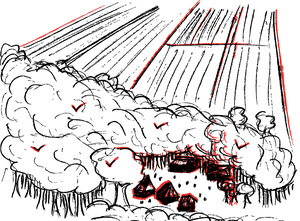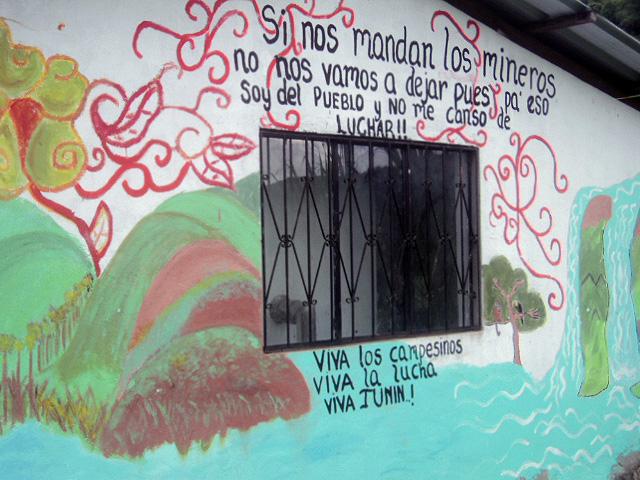EL ACTIVISMO COMUNITARIO FRENTE AL 2005
Carmelo Ruiz Marrero
Claridad, 6 de enero 2005
El activismo comunitario es indispensable para resolver los problemas y afrontar las injusticias que sufre gran parte del pueblo puertorriqueño ya que las estructuras formales y canales oficiales que ofrece nuestro sistema "democrático" para remendar agravios no funcionan, señalan líderes comunitarias entrevistadas por CLARIDAD.
Junta de planificación, enemigo número uno
La Junta de Planificación (JP) es el principal enemigo de las comunidades y de la justicia social en Puerto Rico, denunció Haydée Colón, portavoz de la Comisión de Ciudadanos al Rescate de Caimito. Según ella, es por las decisiones tomadas en la JP que "en este país se ha planificado para el saqueo".
"Es por las decisiones de la JP que los pescadores de Río Grande y Loíza son despojados de su oficio por unos procesos que favorecen a Coco Beach y (al desarrollador) Arturo Diaz", sentenció Colón. "Es por causa de la JP que en Manatí colapsan casas que se hicieron sobre mogotes; en Boquerón abren brazos de mar para acomodar viviendas caras; Palmas del Mar crece a cuenta del espacio, identidad y calidad de vida de Humacao; y se autoriza el uso de suelo para la construcción de casinos en Ramey y nuevos hipódromos como el de Santa Isabel."
"Vemos cómo van privatizando las playas; los montes los cercenan para hacer canteras; Cataño se ha quedado sin área rural; y terrenos de dominio público pretenden pasarlos a intereses privados."
Para Colón, el partidismo político y las campañas electorales no son más que un circo enajenante que impide el que las comunidades puedan articular sus planes de supervivencia y desarrollo, los cuales se deben trazar fuera de líneas partidistas. "Mientras los políticos se entretienen dividiéndonos, una agencia (la JP) controla el desarrollo del país, y cuando va a las comunidades va a imponer, a violentar y agredir mediante el uso del suelo."
La líder comunal caimiteña expresó una profunda decepción con el gobierno de Sila Calderón: "Muchos de los que estamos en las luchas comunitarias esperábamos un mayor espaldarazo de doña Sila." Lo más hiriente para ella fue que el gobierno jugara con el acceso a la educación de comunidades pobres para así desarticularlas. Caimito no tiene una sola escuela secundaria a pesar de tener una gran población. Colón sostiene que esa carencia responde al interés del gobierno en hacerle la vida difícil a los caimiteños para que se vayan y así sus comunidades puedan ser reemplazadas por urbanizaciones de gente acomodada.
"Jamás pensé que agencias tan importantes para lograr la felicidad del puertorriqueño mediante el uso adecuado del suelo harían tal cosa. Jamás pensé que con toda la lucha que se ha dado fuesen capaces de traicionarnos con un asunto tan básico como el derecho de nuestros jóvenes a la educación. Aquí desgraciadamente se están sembrando las condiciones para que nuestros jóvenes no tengan destrezas. Si el activismo comunitario no recoge la problemática de la educación y recreación de los jóvenes, lo que vamos a tener en el país será una guerra civil."
Colón dijo a CLARIDAD que apuesta a que la gente en las comunidades son las que van a hacer una diferencia, y que deriva inspiración y aliento de otras luchas en el país, como la de Vieques, la de los pescadores, los vecinos que velan por el rio Guaynabo, y los que luchan contra las canteras en Juana Díaz, entre otros.
Por otro lado, ella no espera nada de nuestra legislatura. "No veo cambios en la mentalidad de los legisladores. Ellos deberían reflexionar que cada vez que les da con usar dinero público para su propio beneficio lo que hacen es condenar a más jóvenes a no tener acceso a una educación. A la hora de buscar votos se pintan como los más solidarios con las comunidades, y desgraciadamente muchos les creen."
Hacia una participación ciudadana real
"La participación ciudadana aquí en Puerto Rico es una gran farsa, es totalmente ilusoria", denunció Mary Anne Hopgood, quien ha llevado la voz cantante en contra de los desahucios en el sector Antonsanti en Santurce, ubicado entre la calle Del Parque y la Avenida de Diego, detrás del Museo de Arte.
"La mayoría de los mecanismos existentes para que una comunidad pueda llevar unos reclamos o una problemática son totalmente hostiles en el sentido de que son burocráticos, nunca concluyen en nada, son demasiado ritualistas y no conducen a la real solución ni a la participación ciudadana."
Hopgood, creadora de la página web santurcenosevende.org, puso como ejemplo las vistas públicas. "Las vistas públicas no te llevan a ningún cambio. Lo hemos comprobado tantas veces ya, que yo creo que ya nadie quiere seguir tan siquiera esa ruta."
Criticó duramente el Programa de Comunidades Especiales por percibirlo como un mecanismo para nuevos tipos de dependencia y clientelismo. "Es un programa paternalista, crea dependencia del gobierno y pretende mantener las comunidades pobres enmarcadas dentro de lo que un sector pudiente determina. Le dicen: 'Tu eres una comunidad especial, te voy a hacer unas mejoras pero de aquí tú no te mueves'. Esa iniciativa va a fracasar."
Hopgood expresó también un fuerte escepticismo acerca de iniciativas como las Cumbres Sociales y la Sociedad Civil en Marcha. "Todas esas organizaciones que pretenden llevar la gente a estos paneles de discusión de mañanas y tardes, realmente van a perder el pulso real de la fibra de una comunidad, que es la vida cotidiana."
"Lo que veo ahí es gente fuera de las estructuras del poder pero que aspiran al poder. Se están organizando con aspiraciones políticas. Pero la sociedad civil persigue el bienestar de la gente, no tiene afán de poder. De cualquier modo, el poder es ilusorio porque hay que plantearse quién lo tiene realmente. No lo tiene ni el gobernador ni la legislatura; el poder lo tiene el capital, la banca, los grandes intereses, los que determinan dónde se van a mover las cosas y cómo se va a desarrollar el país."
Los ambientalistas han sido los grandes ausentes en las luchas comunitarias, considera Hopgood. "Yo los he visto perder terreno en los últimos años. Se desarticularon por estrategias de los gobernantes y la gente en el poder que son muy efectivas. Les dieron una especie de Blue Ribbon, les otorgaron unos poderes y eso los desarticuló totalmente. Ni hicieron la funcién de ser vigilantes porque estaban comprometidos con una agenda de gobierno, ni pudieron hacer señalamientos de valor."
Pero para ella el cuadro no es todo negativo. Ve que hoy hay gente protestando como nunca antes, creando nuevos focos de oposición a los atropellos, y eso es esperanzador. Dio como ejemplo los pescadores de Rio Grande protestando porque le iban a hacer un paseo en su playa. Salieron al mar con cuatro lanchas y lograron aparecer en las noticias y obtener atención. También comunidades con problemas de agua que se han puesto a arreglar tuberias.
"La gente está buscando intervención directa y real", expresó Hopgood. "Reclamamos una real participación ciudadana en todos los ámbitos que impacten a las comunidades, ya sea en distribución de fondos o la administración pública, de manera que tengan peso y se tomen en cuenta."
Etiquetas: Carmelo, esp, Haydee Colón, Puerto Rico

 A fines de noviembre se conmemoran los fallecimientos de dos gigantes de la sátira boricua: Eddie López y Roberto Fernández Coll. Esta columna va dedicada a la memoria de ambos. (En la foto "Fernando Clemente" con su hijo, el cantautor y comediante "Robi Gris")
A fines de noviembre se conmemoran los fallecimientos de dos gigantes de la sátira boricua: Eddie López y Roberto Fernández Coll. Esta columna va dedicada a la memoria de ambos. (En la foto "Fernando Clemente" con su hijo, el cantautor y comediante "Robi Gris")

 Una nueva publicación conjunta de GRAIN y WRM (Movimiento Mundial por los Bosques Tropicales) analiza los peligros para las comunidades campesinas que provoca uno de los principales mecanismos del mercado de carbono que será parte de la discusión durante la próxima cumbre de la ONU sobre cambio climático en París.
Una nueva publicación conjunta de GRAIN y WRM (Movimiento Mundial por los Bosques Tropicales) analiza los peligros para las comunidades campesinas que provoca uno de los principales mecanismos del mercado de carbono que será parte de la discusión durante la próxima cumbre de la ONU sobre cambio climático en París.